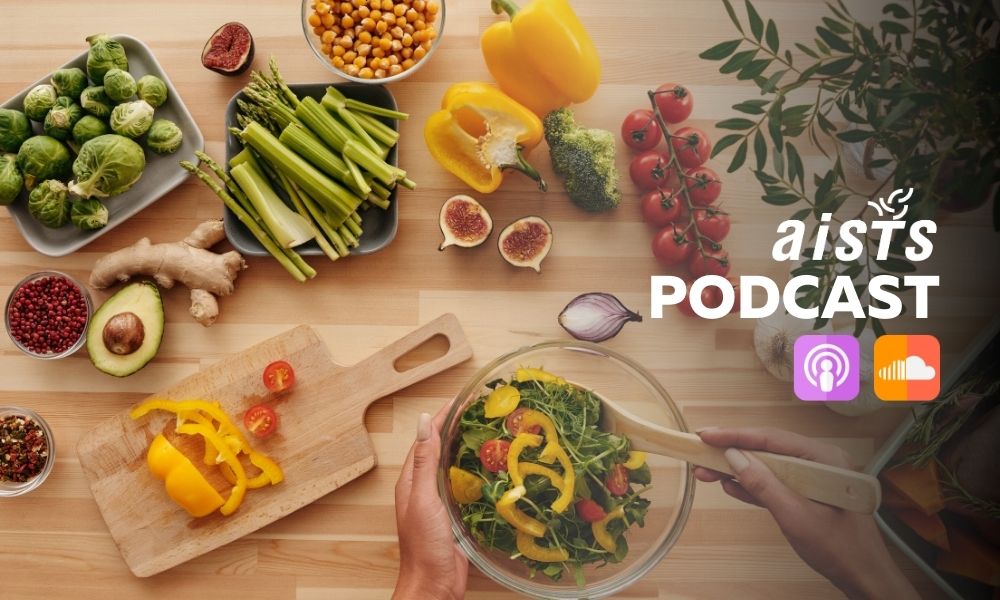
AISTS SPORT MEDICINE PODCAST #63
Can taking a break from your diet lead to more successful results?
The human metabolism is a complex system. If a diet is to be successful, a more precise understanding of the relevant mechanisms helps. This includes the fact that the body always strives for balance. If you don’t understand how to “outsmart” it, a diet has little chance of long-term success. Let’s look beyond the input vs. output rule.
This AISTS Sport Medicine podcast is created by AISTS Class of 2019 Emily JOHNSON-HAUG and Pavel OROZCO under the supervision of Professor Boris Gojanovic, MD.
Pavel: Hello, everyone. Welcome to the podcast with Emily and Pavel. Today we will talk about if taking breaks from your diet leads to more successful results. My name is Pavel; I am a former athlete as I gained some weight since I retired. I am here with my friend Emily who is a personal trainer and nutritional adviser about how to diet. So Emily, where should we start? Since dieting became a healthier reality for a significant proportion of the developed world as obesity has become an epidemic. Dieting is so hard, you know I think I have bad metabolism.
Emily: Well, you know Pavel’s metabolism isn’t really something bad or good. Metabolism is basically extracting energy from the food that we eat in order to do our biological processes so that when we eat something, it turns into ATP. ATP is a sort of fuel in our body. When we have too much ATP though it goes directly into our adipose tissues, which are fat storages, so when we have a fast metabolism, it actually means that we are able to extract all of the nutrition from each calorie to use them in processes either to store or use them for energy so when you have a good metabolism or desirable metabolism actually means that you have a slow one because you want it to be less efficient. It is not taking all of the energy from the calories we are eating it’s just getting rid of some of the energy.
Pavel: Oh sounds like the key is in the calories.
Emily: Well yeah exactly, so basically you want to have them in order to maintain weight. You want to consume the same amount of calories that you exert but if you wanna lose weight, you need to be exerting more calories than what you take in.
Pavel: So, should I just exercise more?
Emily: Well, that’s a really good point that you bring up Pavel, because most people think that calories out the energy out is just exercise but actually there are four main components to calories or energy out. One is your resting energy expenditure REE or your BMR. This is like seventy percent of the amount of energy that you exert every day and you have your non-exercise activity thermo-genesis or need for sure, that’s like taping your fingers, chewing gum things that you do or maybe even using your hands when you talk. Exercise activity that’s only one of the four factors and then you also have a thermic effect of eating so every time that you eat, it actually takes calories or energy to just process the food that you have eaten.
Pavel: So it seems like a few weeks after dieting doesn’t work anymore.
Emily: Yeah that’s a good point Pavel. So your body always wants to go to homeostasis. Homeostasis is just balancing who you are and balancing the internal processes so after a long time of dieting your body adapts.
Pavel: Wait, wait, wait … what is that supposed to mean?
Emily: Well, it means that your metabolism is no longer doing what you might want it to do because you are giving it lower calories it balances out on the same amount of calories.
Pavel: You mentioned hormones, but I thought that was a problem only for teenagers?
Emily: Well that’s what a lot of people think but hormones are actually just the different things that put us into that homeostasis or balance. In particular, when it comes to dieting, there are two hormones that we care most about; leptin which basically makes us feel satisfied and ghrelin, that for sure makes us feel hungry. Leptin comes from fat cells, so as we lose fat, there is no longer so much leptin that could make us feel full and with less fat we have an increase in ghrelin so we less satisfied and hungrier.
Pavel: It sounds like there is no hope for dieting.
Emily: Yeah, it does sound like that but actually, there is a recent study that came out called the matador study. They took participants who were all obese and nineteen when on sixteen weeks of continuous dieting, where seventeen of them actually took diet breaks they dieted for two weeks and then took two weeks off. Now during the diet face, they were on sixty-seven percent off of maintenance calories but because our body always goes into homeostasis, it wants to balance itself out. This amount of calories were readjusted throughout the study. One thing that was found out is within the first two weeks, you have the biggest drop of metabolic change to come back into homeostasis, where you are resting and energy expenditure goes down. We know from other studies that increased calories can bring your body back into a higher metabolic rate so, restoring your metabolism and increasing leptin. The study also found out that the group who took breaks lost more weight during the dieting phase and specifically, they lost more fat mass. Seems like taking diet breaks helps mitigate the adapting processes in your body and ensures that you have better fat loss on higher calories.
Pavel: So it seems like the key is to avoid the adaptation.
Emily: Exactly, so also we found that you are less likely to have chances of having a rebound and regaining all of the fat if you have less over reduction in that resting energy expenditure which can be helped by taking diet breaks.
Pavel: But what happens after the diet?
Emily: Yeah, thats a really good point. Most people think once they achieve their goal, everything is fine and dandy and they can return to eating the same way that they were before, but just like we talked about your body is always adapting so your body is used to these lower calories when you all of a suden give it way more calories, you are just going to store everything as fat. So it’s really important that there is a phase afterwards, more research needs to be done, but it looks like the idea is to have a slow increase on calories until you are back to your comfortable level.
Pavel: Wow, thank you for the information. Now I have a better overview of how I can make my diet more successful; thank you Emily.
Emily: You are welcome, Pavel.
You can find more AISTS Sport Medicine podcasts on our Soundcloud channel or on the Apple Podcast app. To learn more about the AISTS Master of Advanced Studies in Sport Administration and Technology, visit https://aists.org/education/masters-degree/
Recent articles





